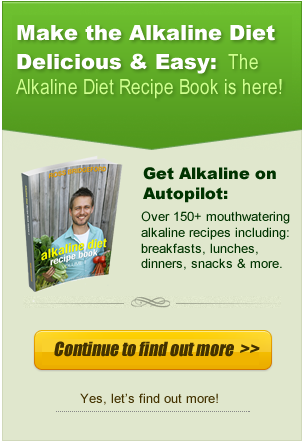Alkaline Diet Evidence: Another Scientfic Journal Backs Dr Young’s Theory
I’m often asked: if Dr Young is so sure about this Alkaline Diet theory, why hasn’t anyone ever validated it with a study?
A kinda strange question.
My answer is this:
To research a whole, holistic approach to health would cost millions. You would have to have a significantly sized sample group all following this diet to the letter over a very long period of time. To test for results against outcomes as wide ranging as from cancer to eczema and from libido to acne would require a massive sample and so many different control groups it is just impossible.
BUT what you can test is individual effects, and this is already being done in the health and science world.
I posted a few months ago about the alkaline diet and bone health being validated in the Journal of Clinical Endocrinology & Metabolism and there are heaps of other studies, from peer-reviewed, top-ranked, scientific journals that prove that meat and dairy cause cancers, vegetarians have a lowered risk of heart disease and diabetes, high-sugar drinks lead to osteoporosis, a diet rich in omega 3 protects against brain and motor-skill degeneration etc. These are all backing up the alkaline diet as each is proving the efficacy of each of the core principles of alkalising.
The Alkaline Diet Cures Everything?
 Just because a study is yet to be published in AJCN or BJM that has the headline: ‘Alkaline Diet Cures Everything’ – does not mean that this approach to health is not constantly being validated, bit by bit, in various prestigious journals all over the world.
Just because a study is yet to be published in AJCN or BJM that has the headline: ‘Alkaline Diet Cures Everything’ – does not mean that this approach to health is not constantly being validated, bit by bit, in various prestigious journals all over the world.
Which brings me onto this belter of an article I have just stumbled upon from the Journal of Nutrition. Published in January 2008, the title is: The Balance of Bone Health: Tipping the Scales in Favor of Potassium-Rich, Bicarbonate-Rich Foods
The Alkaline Theory is Put Beyond Doubt
I will firstly summarise the article, and then give my thoughts and opinions on this and relate it back to Dr Young’s theories. There are a lot of related points and so I will bullet point them so that I don’t lose you or get lost myself!
Summary of the Article
The article is concerned with the bone health in the Western world, with costs estimated at $17.9 billion per year in the USA and costs in Europe well in excess of €13.9 billion being spent on treating osteoporosis.
The review article outlines the current evidence available in the literature linking potassium-rich, bicarbonate-rich foods to osteoporosis prevention and bone mineral density (BMD). The review includes clinical studies, dietary intervention studies and cross-sectional/longitudinal, observational studies from a variety of peer-reviewed research studies/articles.
In short, the review covers a substantial amount of literature in this field and the findings are that:
A diet rich in vegetable and fruits that are high in potassium and bicarbonate has an unquestionable benefit to bone health
Key Points, My Thoughts & Why This Matters
The philosophy of the alkaline diet (briefly) is that the body has to maintain a pH balance of 7.365 in the blood and other cells. In the same way that it has to maintain your body temperature within a certain range – it will also do whatever it takes to maintain that pH balance. To do so we have a small amount of alkaline buffers to neutralise acids consumed, however, with the modern Western diet this buffer is always very quickly exhausted, and the body has to draw alkaline minerals (magnesium, potassium, sodium and calcium – principally) from wherever it can to keep our pH at 7.365.
This article is cast-iron guaranteed proof of this philosophy. So with this in mind, here are my thoughts on the key points. I am going to bullet my points for the sake of brevity!
- The article states that a diet rich in potassium and sodium bicarbonate (both highly alkaline minerals) leads to stronger, more health bones. In fact it actually states “potassium-rich, bicarbonate-rich foods (i.e., fruits and vegetables or dietary alkali) (are linked) to osteoporosis prevention” – however, it also goes to point out that vegetables are a far superior source than dairy because not only are vegetables a source of the combination of potassium and bicarbonate but also, the vegetable diet reduced the “acid load” compared to dairy and led to higher calcium absorption.
- The article also references the famous Aberdeen Prospective Osteoporosis Screening Study (APOSS) stating that:
(the study has) shown specific associations between nutrients found in abundance in fruits and vegetables and both axial and peripheral bone mass and markers of bone resorption. Women (n = 994) in the lowest quartile of intake for potassium, magnesium, fiber, vitamin C, and ?-carotene had significantly lower lumbar spine and femoral neck bone mineral density (BMD)…APOSS has shown a consistent longitudinal beneficial effect of fruit and vegetable nutrients on bone loss in premenopausal women
- My favourite quote from the study, however, is this:
Adult humans on a normal Western diet generate ~1 mEq/kg body weight of acid per day. Of course, the more acid precursors a diet contains, the greater the degree of systemic acidity. Hence, in the West, there are good data to show that we consume a very acidic diet.
Clear mechanisms exist for a deleterious effect of acid on bone.
Novel work in the 1980s by Arnett and Dempster demonstrated a direct enhancement of osteoclastic activity following a reduction in extracellular pH. This effect was shown to be independent of the influence of parathyroid hormone. Osteoclasts and osteoblasts appear to respond independently to small changes in pH in the culture medium in which they are growing. Work by Arnett and Spowage and work by Bushinsky have shown evidence that a small drop in pH, close to the physiological range, causes a tremendous burst in bone resorption. Metabolic acidosis has also been shown to stimulate resorption by activating mature osteoclasts already present in calvarial bone rather than by inducing formation of new osteoclasts.
To put this in simple terms: when our cellular pH goes down, our bones break down. This makes even more sense when you understand that ‘bone resorption’ is the process by which osteoclasts break down bone and release the minerals, resulting in a transfer of calcium from bone fluid to the blood (definition from Wikipedia).
So – when our pH drops, our bones break down to release alkaline minerals back into our blood to raise the pH of our blood and other cells!
This is solid, solid proof of Dr Young’s theory! As stated earlier, when we consume too much acid and exhaust our alkaline buffers, our body grabs alkaline minerals from wherever it can to neutralise these acids – and this is a really clear example of this happening.
- Back to the article – “a recent Swiss study suggests a strong beneficial effect of alkali supplementation in osteopenic women…potassium citrate supplementation studies have shown a beneficial effect on bone turnover markers” – more proof
- And interestingly, giving some scope for the elusive ‘Alkaline Diet Cures Everything’ headline:
The DASH trial was the first to indicate a link between a dietary alkali load and bone. The DASH diet comprises careful selection of low-fat dairy products, reduced amounts of meat, and a high consumption of whole grains and fruits and vegetables. In contrast, the control diet in the DASH trial reflected a typical Westernized diet that is higher in fat and low in dairy, fruit, and vegetable products. The DASH diet was associated with a significant decline in blood pressure compared with baseline measurements.
What’s this? The subjects who were following an alkaline diet not only had much stronger bones but they also showed a significant decline in blood pressure compared with those not on an alkaline diet.
This research study clearly puts two things beyond doubt for me:
- Consuming dietary or supplementary alkali will help maintain and grow bone density
- Consuming an overly acidic diet will lead to bones breaking down in order to maintain blood and cell pH at the slightly alkaline level of 7.365
I’ve always truly believed in the alkaline approach to health, but I have to say, this article puts it well beyond doubt for me. For a review article to get published in such a top-ranked, peer-reviewed Journal, that lists study after study after study backing this theory is simply absolute, unquestionable validation of the alkaline approach to health.
I’d love to hear your thoughts below!
Have a great day
Ross







It seems that people that eat the traditional diets seem to develop disease when they begin eating a western type of diet. I have encountered many interesting nuances in the genetic makeup of people that typically ate a varied alkaline diet. The western heavily acidic diet has seemed to develop a difference in genetic nuances, perhaps has genetic identifying markers of subclinical illness, due to the extent of the western more recent (1000 years or so) diet. These genetic markers seem to be more pronounced in members that have depended on the more staple-acidic type of diet. However, as members of other more traditionally based diets begin to consume the staple-acidic diet, the genetic expression seems to show up, but to a lessor degree. Something like diabetes, cancer or heart disease would be a disease. A genetic marker would be something like a POS androgenic symptom which would create an identifying feature that would provide clue to the underlying disease. This would become more pronounced in a society consuming a staple-acidic diet due to the increased reproduction of those carrying the gene but able to reproduce. Those that did not carry the gene would have the disease “hidden” and reproductive efforts would be more futile. This would explain why so many diseases of the west have genetic many more “marking diseases” than people that ate a more traditional alkaline diet such as the native americans.
The internet has proven to be a god send over and over again allowing the public to find the truth behind the synthetic lies governments, corporations, mainstream media and pharmaceutical companies have been feeding us for to long. It’s the passion of sharing good informative information that will help the world population gain a healthier lifestyle. Thank you for caring about your fellow man by continuing your efforts in living a healthier lifestyle and better choice and informative living. I’m writing a post myself on the dangers of the swine flu vaccine seemingly forced upon society so quickly filled with toxins without knowledge of the ‘virus’ or side effects on the vaccine. Our bodies will take care of us as soon as we take care of our bodies. Keep up the great work, will be following your opinions and passing you along to my readers
Hi Amanda
Thanks for stopping by and taking the time to contact us. I look forward to reading your article – be sure to let me know once it is published.
Have a great week
Ross
Thanks for taking the time to post this information. My mother has really bad osteoporosis and I onced asked my doctor what I could do to decrease my own risk of developing it. He replied “If you have a family history of it you will most certainly get it”. I was pretty aghast at his response. After reading the “The PH Miracle” I felt a shred of hope but still was unsure how effective this diet would be for someone like myself. Knowing that there is plenty of research to support Youngs’s view is empowering. It is so good to know that I really do have a choice and can avoid this terrible disease by taking the right action now!
Hi Zoe
I truly believe that eating alkaline and avoiding acids can have a profound influence on the state of our health, and the scientific research seems to be backing this 100% – not only in terms of saying that alkaline helps, but also other articles pointing out that acids such as colas cause massive difficulties!
Good luck and keep in touch!
Ross
Thanks Ross.
It’ so good to see studies looking at this very important nutritional area. It helps to support what a lot of people believe as well as support the anecdotal evidence of positive results from amending one’s lifestyle to an alkaline dominant one.
Let’s hope we see even more studies in this area.